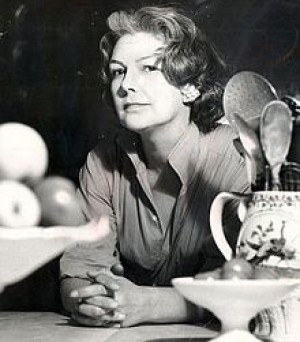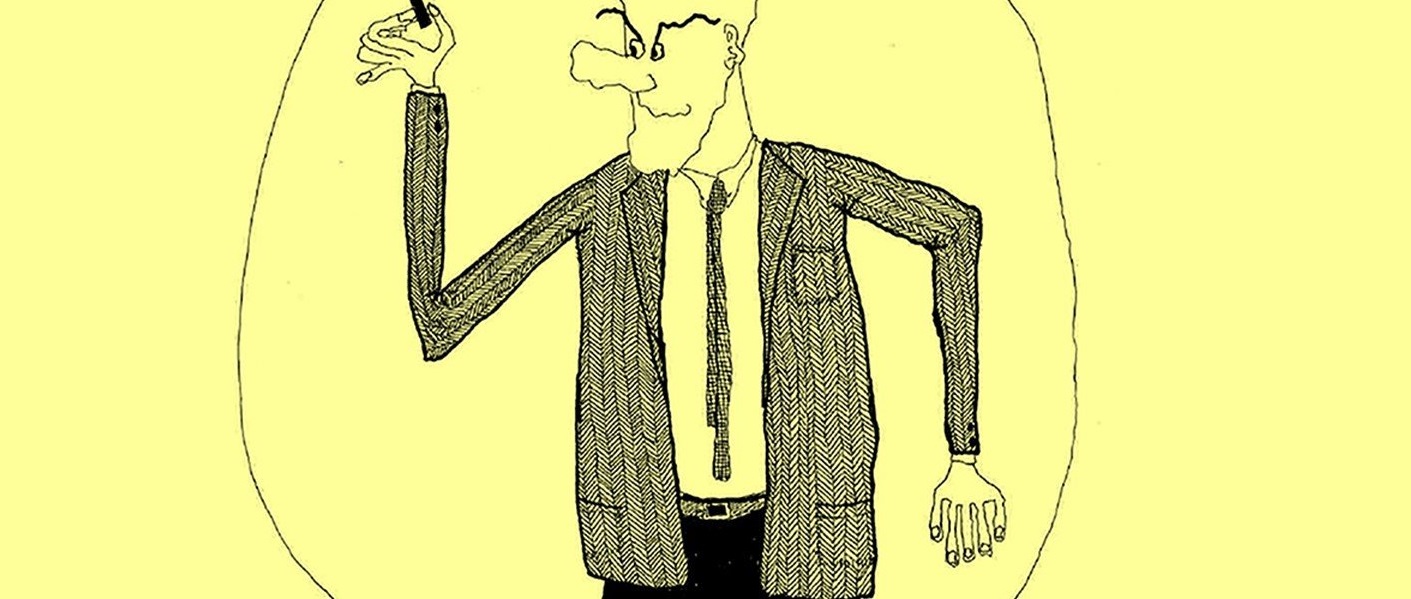Next year (yes, we thought we’d get in first) will be the centenary of the birth of food writer Elizabeth David who, Toby Ash believes, still has more to offer the modern domestic kitchen than all of today’s celebrity chefs put together.
I just can’t imagine Elizabeth David stealing from Tesco. No, not Elizabeth. She was a no-nonsense type, blunt to the point of rudeness, who’d have been too busy regaling the fishmonger about her favourite bouillabaisse recipe rather than trying to filch a stilton and a couple of bottles of plonk.
I confess to having fallen just a little in love with David since I first discovered her books a few years ago. She was wilful, adventurous, determined and uncompromising. But for more than anything, I love her for significantly improving the quality of my life.
Born into a well-to-do family, David was sent off to the Sorbonne in 1930 to study art. It was there, whilst boarding with a French family, that she discovered her vocation:
I realised in what way the family had fulfilled their task of instilling French culture into at least one of their British charges. Forgotten were the Sorbonne professors…what had stuck was the taste of a kind of food quite ideally unlike anything I had known before.
But there was fun to be had first. After the Sorbonne she returned to England where she tried her hand at acting before running off with a married man with whom she sailed in a small boat to Greece. They were nearly trapped by the German invasion of Greece in 1940 but managed to escape to Egypt where they parted. She then ran a library for the British government in Cairo and put up with a brief marriage to a British army officer, before returning to Britain at the war’s end.
David found post-war Britain dull and grey. And, the food, of course, was absolutely terrible:
There was flour and water soup seasoned solely with pepper; bread and gristle rissoles; dehydrated onion and carrots; corned beef toad in the hole. I need not go on.
And so she launched her career as a food writer, introducing to her hungry audiences such exotic ingredients as pasta, parmesan, olive oil, salami, aubergines, peppers and courgettes. Over the course of her long career (she died in 1992) David wrote eight books and countless articles. In the 1960s she even opened a shop in Pimlico selling cooking paraphernalia, opting not to stock garlic presses which she famously (and quite correctly) described as being “utterly useless”.
Now the thing you have to remember is that David’s books are nothing like most of the recipe books that line the shelves of book shops today. They have lots of recipes in them – in fact I’ll wager her French Provincial Cooking has more recipes in it than all of Jamie Oliver’s books combined – but they are so much more than pretty instruction manuals. As Ruth Rogers, Co-Founder of The River Café, told me last year:
You can take any of Elizabeth David’s cookbooks to bed and read them as you would a novel.
David was a beautiful and observant writer. Her books weren’t banged out to coincide with a TV series; they were the product of in-depth, patient and sympathetic research. She was interested in the places she visited and the people she met. She wanted to learn and was able to listen. She could grasp the essence of a region, and food’s place within it.
Here’s an excerpt from her introduction to Provence:
Provence is a country to which I am always returning, next week, next year, any day now, as soon as I can get on to a train. Here in London it is an effort of will to believe in the existence of such a place at all. But now and again the vision of golden tiles on a round southern roof, or of some warm, stony, herb-scented hillside will rise out of my kitchen pots with the smell of a piece of orange peel scenting a beef stew. The picture flickers into focus again.
David opens up a whole new culinary way of life. With la haute cuisine “I am not here concerned”, she states in French Provincial Cooking. Instead, she offers simple food, simply presented; food that demands less time and expense “but if anything a more genuine feeling for cookery and a truer taste”. The book is full of simple, tasty and ingenious dishes that don’t require a mass of expensive ingredients. It’s a quick sauce here, a long simmer there; a dash of this and a handful of that. It’s the melted butter with Dijon mustard and lemon juice that transforms grilled fish. It’s the ground pepper and grated parmesan sprinkled over a bowl of steaming fennel. These are cooking tips that you can use every day to bring out the very best flavours from the food around you.
So did David really transform Britain’s eating habits? Well, she undoubtedly made a massive contribution to culinary life in Britain. But, let’s face it, for as long as we look for culinary inspiration from a four-eyed, bald chef making “the perfect” scrambled eggs by ramming a stick of dynamite up a chicken (or some such nonsense), we probably still have some way to go.











What I love even more than the hymns to continental plenty are the barbed comments on British food at the time especially the essay on the ‘French’ restaurant in Kensington. I can’t remember which book it’s in but worth seeking out.
Wonderful book. No gratuitous food porn photos on every second page. And as you note, there is this wonderful de haut on bas: here is a receipe, however you hapless Brits couldn’t possibly manage it properly because a. you lack the ingredients, b. you lack the French and c. it was whispered to me by old Mère Goriot who, even if you could find her restaurant which is of course unlisted in any vulgar guide, would certainly never offer such information to some wretched aspirational tourist as yourself. An editor of mine once lunched with her. Fired up and trembling, he arranged the best London could offer. He ordered, fearful of every possible blunder. But the menu held no treats for Mrs David and she spurned the lot: he ate and she stuck to gin.
Brilliant. Thank you Jonathon. She was…rather formidable.
There are plenty of good accounts of drek food during postwar austerity, but was it much better before then, at least for those who weren’t invited to Edwardian feasts? Not if what you exported to the colonies is any guide. I’ve just been part of a discussion over here about why there is no indigenous English-Canadian snack or comfort food, and the consensus was that until after the war, our cooking was uniformly bland, overcooked and tasteless. Salt was their idea of an exotic spice and in 1955 a national magazine pronounced barbeque, recently arrived from the States, to be “weird”. The exception was pies and other baking, which were often delicious, but a friend from my youth once caught the culinary ethos by quipping they were the reward you got for getting through the main course.
Thanks for this Peter. I do despair about our relationship with good food in this country. We love it, but only on television while we eat a take away pizza (pies being the great exception, as you correctly point out). Our most overrated dish of course is the ‘Great British Sunday Roast’. But don’t even get me started on that..
I have one of her books, which I keep meaning to get round to reading. Must do it!
If anything at least reading about sun dappled olive groves will lift my spirits somewhat in this chilly February.
Interesting Beethoven-like fact about Elizabeth David – after she suffered a stroke, she lost the ability to taste salt.
I remember my parents being given a tray of avocados in the ’70s. They were at a loss what to do with them and ended up giving them away. I suppose it was a lucky escape – boiling for a good while was probably the default mode of cooking for this sort of thing.
I bought an anthology of David’s three famous cookbooks when I was at school, and was mesmerized by the curious ingredients. I lived almost permanently on ratatouille – my parents were constantly complaining that our kitchen smelled of garlic – and so did I. The glorious simplicity of ED’s recipes (take 10 partridge and 6 pheasant etc) and charming eccentricity of her writing made cooking and eating experimental and fun. So different from the bald one’s curiously convoluted creations – exploding potato doughnuts?! I couldn’t quite believe what I was seeing the other night: cooking potatoes in salt, gutting out the contents and doing something impossibly fiddly over burnt wood chips in a pan, reducing sauce for two hours before infusing it with popping somethingorother. Very odd. And all with so much sugar. YUK!
Absolutely spot on Susan about the “glorious simplicity” of ED’s recipes. As for the bald one, he has become completely ridiculous.
Read my first E.D. “Italian Cookery” at the age of 18 and never looked back. The food not only tasted wonderful to me, but it impressed a lot of girlfriends too. Didn’t take me long to seek out her other books and they are all equally brilliant. None of today’s celebs today can get within a mile of her writing.